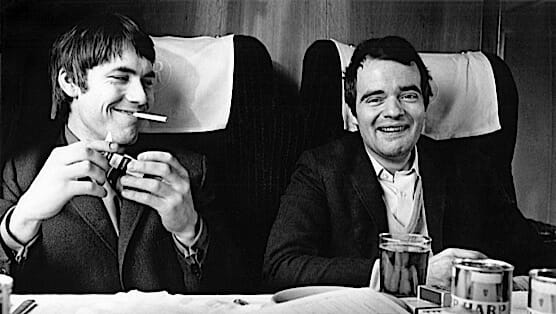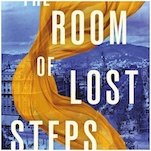Lambert & Stamp

First things first: If you’re a fan of The Who, you’re going to love Lambert & Stamp. I’ve loved them for about as long as I can remember, probably since about 1977, and Lambert & Stamp was loaded with stuff I hadn’t heard. That said, there’s absolutely no reason you need to be a fan to connect to this film. In fact, it’s not really about the band. Well, it is but it isn’t. It’s about Kit Lambert and Chris Stamp and how they tapped into key elements of the Mod subculture in post-war London and discovered—some might say created—The Who. On the other hand, it most certainly is a film about The Who, since by all accounts, the two parties were part and parcel of each other.
What Lambert & Stamp most definitely is, however, is an affectionate, rough-and-tumble and occasionally deeply sad story about the partnership of two immensely creative people and how a chance meeting at Shepperton Studios combined with a rather far-fetched idea about making a film about a band, changed the course of Rock ’n’ Roll.
Lambert and Stamp met while working as assistants at Shepperton, but had come to the arts by completely different paths. Stamp as a stagehand at the ballet (a job suggested by brother Terrence, since the younger Stamp had stated that his only real interest in life was girls and Terrence reasoned that the ballet was a great way to meet them) and Lambert as the child of wealthy artists.
As club owner and Who insider Richard “Barney” Barnes says in the film, Lambert and Stamp were like “chalk and cheese”: Stamp was the working-class son of a Thames tugboat captain and is described by his elder brother, actor Terrence Stamp, as a “rough, tough, fighting spiv (petty criminal),” while Lambert was the upper-class son of a famous symphony conductor. Stamp was a Cockney, with an accent and manner to match, whereas Lambert was multi-lingual, smartly dressed and Oxford-educated with a posh London sound. Not only that, but while Chris was admittedly girl crazy, Kit was gay at a time when homosexuality was still illegal in the UK and very much in the closet.
Lambert & Stamp is as much about the combination of these two visionaries as it is about The Who. Individually, the pair were certainly smart and ambitious, but together, lightning struck. Terrence Stamp referred to their combination as being “like two and two make six” and indeed the sum was greater than the whole.
It also helped that they seemed to have personalities that were instantly likable. Early in the film, Pete Townshend says “I fell in love, I mean literally, with both of them immediately … they completely and utterly, the pair of them, totally changed my life,” while Roger Daltrey remarks that “Kit was the only posh guy I’d ever spoken to that was actually interested in me and wasn’t talking down to me.” It was clear that the pair had a rapport with their young discoveries and in fact, Stamp was only a few years older than the band members. (Lambert was still only 29, though that would have made him like grandpa to most of the Mods in the scene.)
-

-

-

-

-

-

-

-

-

-

-

-

-

-

-

-

-

-

-

-

-

-

-

-

-

-

-

-

-

-

-

-

-

-

-

-

-

-

-

-








































